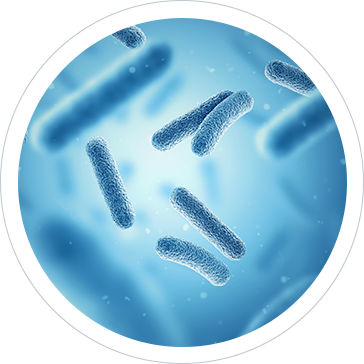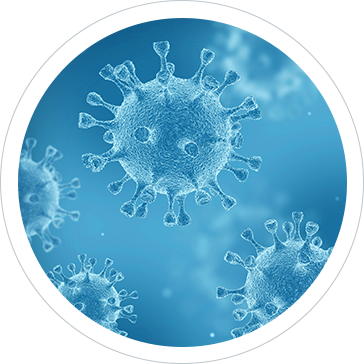
During this very special period of time, hygiene is more than ever an important concern and our
houses become those refuge spaces where we feel safe.
For 150 years, Tefal has been a Linen care expert, mastering heat and steam. Today we bring you this expertise to sanitize your clothes, your home textiles with no chemicals, only the natural power of steam.
Everything your need to know is here!

Bacteria and viruses can infect our textiles, and there is a way to fight against this contamination whenever it is needed : steam and heat.

Bacteria are microscopic, single-celled organisms that thrive in diverse environments.
These
organisms can live in soil, water and inside the human gut.
Humans' relationship with bacteria is complex. Sometimes bacteria lend us a helping
hand,
such as by curdling milk into yogurt or helping with our digestion.
In other cases, bacteria are destructive, causing diseases like pneumonia or Staphylococcus aureus infections.

A virus is an infective agent that typically consists of a nucleic acid molecule in a
protein coat, It is too small to be seen by light microscopy, and is able to multiply
only
within the living cells of a host.
"The hepatitis B virus", Rabies, Ebola, HIV, Smallpox, Hantavirus, Influenza, Dengue,
SARS-CoV, SARS-CoV-2 are all part of viruses family.

Scientific research has shown that:
Influenza viruses can survive on fabrics for 18 hours¹
SARS-CoV-2 (that causes Covid-19 disease) can survive on fabrics for one day, and becomes undetectable after two days !²
And environmental conditions (such as temperature, UV exposure or humidity level) influence how long
viruses can last on surfaces; for instance, they thrive in dry air and low temperature. Studies have
also
found that viruses are heat-sensitive : their lifespan decreases with increasing temperature.
Steam and heated plate are great chemical free methods to inactivate
microorganisms.
What is steam? And how does it work?
Steam is water in the gas phase. It is commonly formed by boiling or evaporating water. Steam
that
is saturated or superheated is invisible; however, "steam" often refers to wet steam, the
visible
mist or aerosol of water droplets formed as water vapour condenses.
Moist heat kills by degrading nucleic acids and denaturing enzymes and other essential proteins.
It
also disrupts cell membranes.
Heated plate, how does it work?
A temperature of over 100° C can be easily reached on the surface of a metallic plate.
A short time exposure of a textile to this kind of temperature with a heated plate will inactivate all common germs, bacteria & viruses, even the most resistant.
Recommended by the french high council of public health³
"The HCSP makes numerous recommendations regarding sales staff and facilities maintenance,
[...] It gives two options before shelving an item that has been tried or returned by a
customer: it
should be stored for at least 24h, or treated by a steam generating system like a garment
steamer -
when the material is able to withstand the process of disinfection."

Tefal range is designed to take care of all your clothes and household furniture quickly and easily.
Sanitize all your clothes.
Our solutions are safe on all fabrics,
even the most delicate ones like
silk.
Sanitize all around your house.
From sofa, to curtains to furniture to bed linen...
Enjoy a clean and safe
environment.

The performance of our products have been demonstrated by external, independent and state of art Laboratories in France and Europa. Conditions of test are representative of a normal usage at home, on cotton fabrics, similar to your usual ironing and steaming practice.
The tests have been conducted on both bacteria (Staphylococcus aureus, Klebsiella pneumoniae, Escherichia coli) and viruses (Murin Norovirus, BCoV, SARS-CoV-2, Parvovirus). Our solutions have proved great effectiveness : steam goes deep inside the textile fibers to kill up to 99,99% of viruses, bacteria and germs.⁴
¹Thompson K-A, Bennett A.M. Persistence of influenza on surfaces. Journal of Hospital Infection 95 (2017) 194-199 http://dx.doi.org/10.1016/j.jhin.2016.12.003
²Chin, A. W. H., Chu, J. T. S., Perera, M. R. A., Hui, K. P. Y., Yen, H.-L., Chan, M. C. W., Peiris, M., & Poon, L. L. M. (2020). Stability of SARS-CoV-2 in different environmental conditions. The Lancet Microbe, 1(1), e10. https://doi.org/10.1016/s2666-5247(20)30003-3
³Coronavirus SARS-CoV-2 : recommendations relating to textiles, and to footwear and clothing retail outlets. (2020, 6 May). High Council of Public Health. https://www.hcsp.fr/Explore.cgi/avisrapportsdomaine?clefr=914
*External tests conducted in independent laboratories , applying the device on cotton fabric and slowly steaming back and forth 3 times

View the product warranty conditions

Find a repairer


